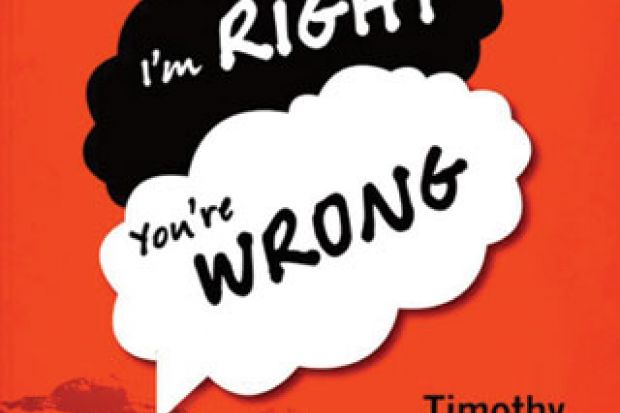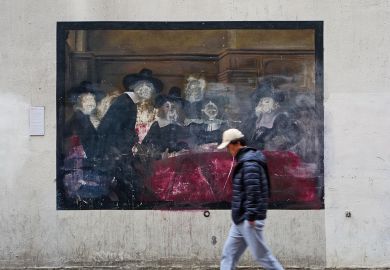Disagreement in debates and discussions is an interesting phenomenon. On the one hand, having to justify one’s views to those who disagree is perhaps one of the best ways to induce a critical re-evaluation of these views. On the other hand, it is far from clear that a clash of opinions will eventually lead to a consensus in which the parties come to hold better views than the ones they held before. This is one of the promises of rational discourse, but one that is all too often not delivered. What to do in situations of discursive deadlock?
Timothy Williamson’s Tetralogue is an investigation of the merits and limits of rational debate. Four people holding very different views sit across from each other in a train and discuss a wide range of topics: the existence of witchcraft; the superiority (and fallibility) of scientific reasoning; whether anyone can ever be sure that they really know anything; and what it means for a statement to be true, among many others. As one of the most influential figures in contemporary philosophy, Williamson is well placed to give the reader an overview of some of the most important debates in recent philosophy, as his characters debate their views.
We meet Bob, who represents those who subscribe to “ancestral” modes of thinking, including superstition, belief in witchcraft and so forth; Sarah, the staunch child of the Enlightenment, firmly convinced of the superiority of scientific knowledge; Zac, the relativist who abhors absolutist views and rejects the idea that anything can be true or false simpliciter; Roxana, a (somewhat unpleasant) latecomer in the conversation, who represents rationality taken to its extreme. She is the one who pursues the logical consequences of each position to its (sometimes absurd) limits, and who perhaps most closely echoes the author’s own voice. As these people try to resolve their differences and convince each other of their own worldviews, Williamson explores the ins and outs of rational debate. In the end, each position is shown to have its weaknesses, but the relativist comes out particularly scathed.
What is perhaps most striking about this book is the dialogical format adopted. Dialogue as a literary form marked the very birth of Western philosophy with Plato’s dialogues, which I would argue remain unsurpassed when it comes to complexity, philosophical sophistication and pure literary beauty (Gorgias is my favourite). In the approximately 2,500 years since, a number of philosophical works have adopted this format, in some periods more enthusiastically than in others. Dialogues were particularly important in the Latin medieval tradition, and the early modern period saw a resurgence of the genre, with thinkers such as Leibniz, Hume and Diderot. But for the most part, philosophical literary forms such as the philosophical essay tend to be superficially non-dialogical, while in practice often corresponding to “internalised” dialogues where arguments, counter-arguments, counter-counter-arguments, etc, are presented by one and the same voice. Indeed, in recent decades very few philosophical works written in explicit dialogical form have appeared, the most remarkable of them being perhaps Imre Lakatos’ Proofs and Refutations (1976).
Williamson’s dialogical approach is reminiscent especially of dialogues by Cicero and Hume, in which different characters are each a mouthpiece for a particular philosophical position. The dialogical format is thus a sensible choice, given that his main topic here is disagreement and rational debate as such.
Tetralogue is presented as an accessible, fun-to-read introduction to philosophical themes for the non-initiated; at the same time, the initiated may enjoy seeing these topics embedded in apparently mundane discussions. In this sense, it is bound to be of interest to a wide range of readers. However, if it is really intended to be a “way into philosophy” for those new to the topic (as the cover would have it), it might have reached its goal more efficiently had it also contained further details and pointers to additional literature (as Lakatos does in his footnotes in Proofs and Refutations).
Without such resources, it is unclear how the interested reader should proceed in order to delve further into these topics. Moreover, Bob, Sarah, Zac and Roxana are drawn as broad caricatures of each of the positions, with no ambition to psychological complexity. The latter might sound like an unreasonable requirement given the book’s stated goals; but the truth is that anyone writing a philosophical dialogue will be confronted with the exceedingly high standards set by the founder of the genre, Plato. Nevertheless, Tetralogue is a stimulating book, and an admirable experiment with an eminently philosophical but arguably outdated literary form – the dialogue – to talk about disagreement and dialogue itself.
Tetralogue: I’m Right, You’re Wrong
By Timothy Williamson
Oxford University Press, 160pp, £10.99
ISBN 9780198728887 and 91044694 (e-book)
Published 12 February 2015
Register to continue
Why register?
- Registration is free and only takes a moment
- Once registered, you can read 3 articles a month
- Sign up for our newsletter
Subscribe
Or subscribe for unlimited access to:
- Unlimited access to news, views, insights & reviews
- Digital editions
- Digital access to THE’s university and college rankings analysis
Already registered or a current subscriber? Login





